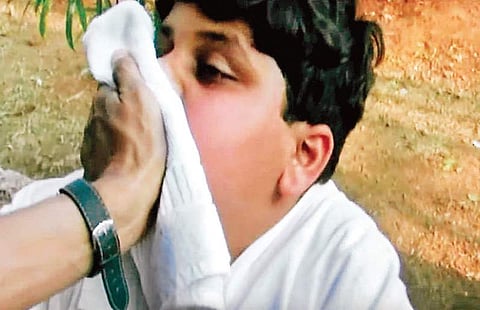

Myth: A handkerchief dipped in chloroform causes immediate unconciousness
Propagated in: Countless Tamil films
A kidnapping scene in Tamil scene is seldom complete without the use of the grand, old chloroform trick. Typically, the kidnapper would douse his white (for some reason) handkerchief in chloroform and then place it over the nostrils of an unsuspecting victim, who’s usually the film’s heroine. And instantly, she drops unconscious. Films that believed in this technique include Ullathai Allitha (1996), Kalyana Galatta (1998), Nesam Pudhusu (1999), Winner (2003) and Looty (2001).
City-based anaesthesiologist Dr Sathya Kumar has always been amused by what he calls ‘incorrect science’. “Chloroform is a liquid with anaesthetic properties that can cause sedation by altering the potassium channels between two cells,” he says, as we pretend to understand what he’s talking about. “Though it’s not a painkiller, the sedation itself can numb the pain and so it was used a century back to provide pain relief during surgeries. But it led to a number of casualties as, if not under proper observation, it might lead to arrhythmia (irregular heartbeat) and death.”
He says Tamil cinema has propagated the notion that chloroform when inhaled can make a person drop unconscious immediately. “You can’t anaesthetise a patient so easily,” he says. “The victim will never faint in an instant. It takes a good two to five minutes for the patient to slip into unconsciousness, and even that only if an unusually high dosage is administered,” adds the doctor, who believes that Tamil films have raised us on bad science.
“Slipping into unconsciousness means you go to a state of sedation where you just sleep. If you sleep and you breathe, it’s not harmful but when you don’t have a control over your tongue, it might lead to obstruction and respiratory embarrassment which might lead to death,” he explains, as we exclaim shock at being conned by Tamil cinema villains.
All Sathya wants is that the filmmakers in question consult a doctor for some free advice. “Whenever they shoot a scene that involves medical science, it would be great if they spoke to someone who understands the subject. Bad science is annoying,” he says, likely quoting Sheldon Cooper of The Big Bang Theory.